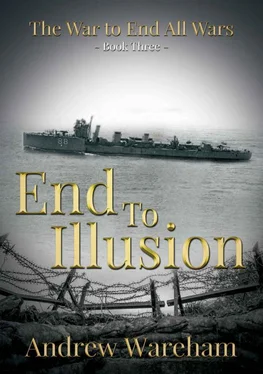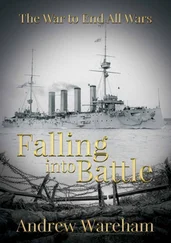“The games you bloody navy types play, Adams! Couldn’t you just get on with winning the war?”
“Don’t be silly, sir! The war is a minor interruption in one’s career. A boy entering Dartmouth at thirteen or so will hope to serve for forty years. A war of four or five years duration is no more than an incident. It provides the opportunity for promotion, perhaps, but it is more important to ensure that one does not tread on superiors’ toes by being too overtly heroic or efficient. Wiser far to proceed cautiously, sir, and above all, do nothing wrong. You saw what happened at the Dardanelles, after all. A bit of a risk and perhaps a modern battleship lost, and the campaign could have been won. The admiral chose to withdraw rather than risk Queen Elisabeth, newest of the fleet. The Navy without exception believes he was right. More important not to lose a new ship than to win a battle!”
“God help us all!”
“He does, sir. God is an Englishman, after all.”
“They are said to be losing thousands in the Gallipoli campaign, which is necessary only because the Navy failed at the Dardanelles.”
“Soldiers, sir. None of the Navy’s business. Not even English, most of them.”
“You are a cynic, Adams. You are right to be so. Let’s get to the coaling berth!”
Coaling a small trawler was an easier business than taking thousands of tons aboard a battleship. They were barely two hours at the berth, most of that spent waiting their turn.
They pottered across to the munitions wharf, hoses playing on the decks to get rid of the coal dust.
“Full magazines, Mr Adams. Extra three-o-three this time, for the Vickers and our rifles. I have put in for revolvers for the boarders, hopefully.”
“Unwise, sir. They will issue you with cutlasses. Any money you like, they will!”
Murchison did not believe him, was left open-mouthed when a party of fellahin were sent aboard carrying forty blades.
“Beg pardon, sir. Grindstone to follow. Must be sharp. One fellah to stay aboard to sharpen and polish the valuable swords, sir.”
The Egyptians were chased ashore, their crates of cutlasses thrown after them.
Christopher laughed as the officer in charge protested.
“You have boarding parties, you must have cutlasses. Admiralty regulations!”
“Balls to the Admiralty, mister! If you have revolvers, I will take them. If you haven’t, rifles or short carbines will do. Bayonets if you have such things. Your cutlasses, mister, you can stick where the sun don’t shine!”
The officer in charge was an ancient post-captain, forty years at the Gun Wharf and climbed only recently to his eminence. He was indignant and debated calling for the arrest of the insolent trawlerman. He had heard the rumours of the behaviour of skippers at Malta, and that they had succeeded in getting their own way, the Admiral himself defeated by their intransigence. He capitulated.
“Sidearms, officers, for the use of – I have fifteen, three for each trawler, and forty-five calibre rounds. They are the wrong sort, sent to us in error. American guns, would you believe! I have not issued them, obviously, not for the Royal Navy!”
Christopher listened and intervened.
“Excellent, sir. We need one for each boarder, a total of one hundred and fifty.”
That was impossible. It could not be done. They compromised on forty-five and two packets of fifty rounds for each revolver.
Christopher oversaw the delivery to each of the trawlers and then double-checked the remainder of the indents to each ship. They sailed away with magazines completely full.
“How did you know, Adams? He said he had just fifteen.”
“Wrong number, sir. Ordnance would never deliver just fifteen of anything. He probably has four hundred or so, might be more. It’s just that he would never wish to issue anything, on principle. You don’t get promotion by putting weapons into the hands of sailors. Better far that everything stays neatly on the shelves, looking tidy. If you issue guns and ammunition, you leave gaps and you have to indent for more from England, suggesting you have been spendthrift and careless in giving valuable stock away. Wasteful officers do not rise in the world!”
“Are you serious?”
“Damned right, I am, sir! Thing is, sir, you are hostilities only, here for the purpose of fighting a war. You, as a result, think the war is important. The Navy still thinks the war is a sideshow. All of the senior officers have spent their careers at peace and have formed their habits of thought in polishing the brass and showing majestic in foreign ports. War is an intrusion into the proper naval ways of doing things, and they resist it. Most of them don’t understand what is happening or why. You still hear them saying that submarines are ‘unfair’ and expecting the Kaiser to realise he is cheating and withdraw them from the war. We have a Navy of old buffers who are jolly good chaps – bloody hopeless!”
“God help England!”
“Too late, sir.”
They sailed, lost in their own thoughts. East of Alexandria by an hour, on their way to the Canal, they crossed the course of an old battleship coming south from Gallipoli to the dockyard to repair shell damage. They dipped their ensigns in salute and proceeded on their way.
“Adams! That old battlewagon is signalling. For us, I think!”
Christopher had been belowdecks checking the charts for the Red Sea, trying to work out a best course and memorise his turning points. He ran up to the bridge, glanced across to the battleship’s signalling mast, translated the flags for Murchison.
“What ship? Why are you in disorder?”
“What does he mean, Adams?”
Christopher gestured astern to the four other trawlers, in no formation, two of them close alongside and shouting to each other, the remaining pair in company and more or less in line abreast, none of them much more than a hundred yards distant.
“Ships on passage are to maintain line ahead at a precise interval of two cables, sir. Naval regulations, sir.”
“Balls to that! They are all in easy sight of each other and of me. That’s all I want. Make, ‘me no savvy’, Adams. Play the game.”
Christopher shook his head and climbed up high on top of the wheelhouse and semaphored, slowly.
‘HM Trawler Hans Heine. Bound for Red Sea.’
He jumped down and waited, gave Murchison the reply.
“Heave to and wait for boat, sir.”
“Tell him I am under orders to make best speed for Port Suez, Adams.”
Christopher climbed back up and semaphored again, performing the movements of hands and arms very slowly and deliberately.
He watched as the battleship acknowledged while coming round to make a shelter for the steam picket boat it was dropping from its davits. He took up his glasses and watched as a white cap swarmed down the falls and took position in the stern.
“Officer aboard the boat, sir. Commander, by the looks of him. Probably a senior captain in command to make such a fuss and send his second; one of the oldest of the old school. Steam picket boat has a speed of maybe eight knots, sir, when she is up to full pressure. Stoker will still be building a head of steam and she is half a mile distant. She might just be able to intercept us, coming from off the port bow. Can’t change our course, sir; mustn’t be seen to run away.”
Murchison whistled down the engineroom voicepipe, called for steam for ten knots.
“Jimmy!”
A deckhand looked up inquiringly.
“Shout across to whoever’s nearest, tell them to make ten knots for the while.”
Jimmy ran to the stern and bellowed.
“Good voice on him, that lad, sir.”
“Strong lungs, our Jim, Adams.”
The picket boat fell into their wake, never able to catch up with them. They waved to the gesticulating officer aboard her.
Читать дальше












